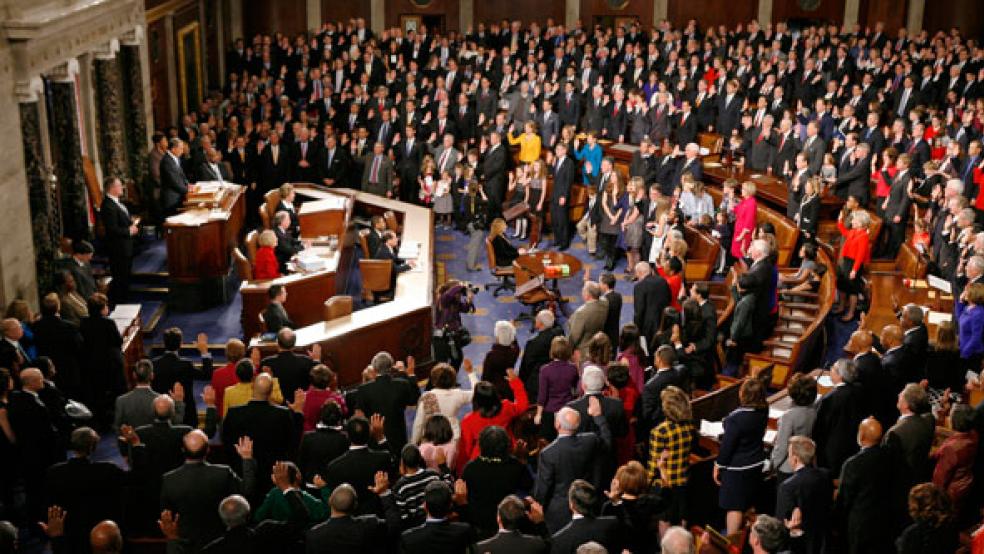After the presidency, all eyes will be on races for the Senate, which the Democrats currently control, 53 to 47, with the help of two independents.
Republicans have a distinct advantage: While Democrats have to protect 23 of their seats, the GOP has to guard only 10. That means that in their climb towards a majority, the Republicans start with 37 Senate seats baked in the cake, along with five GOP nominees in conservative states running with little if any real competition. Retiring Democratic Sen. Ben Nelson’s seat in Nebraska also looks like a gimme for the GOP, as Republican Deb Fischer is running well ahead of former Democratic senator and governor, Bob Kerrey.
Winning eight more seats to secure a 51-seat majority will be a heavy lift, however, especially with Indiana and Missouri now in doubt, thanks to gaffes about rape from Mourdock and Akin. Democrats are also waging strong challenges in deep blue states : Elizabeth Warren is leading Republican Sen. Scott Brown in Massachusetts and Rep. Shelley Berkley is mounting a tough challenge to Sen. Dean Heller in Nevada with the help of Senate Majority Leader Harry Reid.
Sen. Jon Tester of Montana is arguably the most endangered Democrat seeking reelection. He has been locked in a yearlong battle with his Republican challenger, Rep. Denny Rehberg, who has blasted him for supporting key Obama administration programs.
The wildcard of the campaign is former Gov. Angus King of Maine, who is running as an independent for the Senate seat being given up by Snowe. A fixture of Maine politics for decades, the plainspoken King, 68, is the favorite to win the race, but he has given few clues as to which party he would caucus with if he wins. Depending on the outcome of the other races, King could determine whether the Democrats or the Republicans can claim the majority. Odds are that he would side with the Democrats.
While it’s too early to precisely call the results in the House, it’s already apparent that the lineup in the 113th will be less ideological and less polarized than the Tea Party-influenced 112th Congress.
At least two dozen Republican freshmen running for a second term are facing stiff challenges from an emboldened Democratic Party, whose Congressional Campaign Committee chairman Steve Israel of New York has been insisting since January that the House is “in play.” In other districts, redrawn boundary lines have created more centrist terrains, forcing both incumbents and challengers to seek that elusive middle ground occupied by independent voters, who will likely have a disproportionate influence on Nov. 6.
The math behind a Democratic takeover is daunting. Dems must pick up 25 seats to regain the majority and take the speaker’s gavel away from Rep. John Boehner (R-Ohio). Most prognosticators dismiss that possibility. The Washington Post election tracker for the 435 races calls Republican candidates “solid” or “likely” in 207 races, just 11 shy of the 218 needed to retain a majority. With another 19 leaning Republican and 26 races deemed a toss-up, the Democrats would have to come close to running the table – a wave election – to recapture control.
“After looking at all of the individual district polls . . . and talking with both Democratic and Republican insiders . . . I see little evidence that Democrats are close to gaining the 25 seats they need to win control of the House,” independent analyst and Roll Call contributor Stuart Rothenberg wrote earlier this month.
“We wanted to remain on offense and we have,” said Paul Lindsay, a spokesman for the National Republican Congressional Committee. “Many incumbents will have challenging races, but at the end of the day, voters will be pleased that they stood up to reduce the size of government.”
Democrats remain hopeful that a last minute wave could return the House gavel to minority leader Rep. Nancy Pelosi of California. “People didn’t think we were going to regain a majority in 2006 until a week or so before the election,” said Jesse Ferguson, a spokesman for the Democratic Congressional Campaign Committee. “With a close presidential race, where it’s between us getting our votes out and them getting their votes out, it could come down to 500 or fewer votes in a lot of these House races.”





